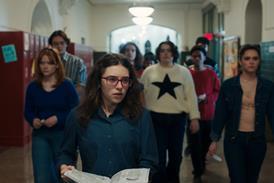Dir: Rebecca Miller. US. 2001. 85mins
There's a muscular punch to Rebecca Miller's Personal Velocity, the winner of this year's Grand Jury Prize for best dramatic feature at Sundance, that propels her triptych of female portraits way above the soapy women-in-peril melodramas that have become stereotypical of so many trashy TV movies, particularly in the US. Like the eponymous book of seven short stories from which she adapted this digital video production, Miller zeroes in on her straight-shooting central characters with a studiously unsentimental detachment and brusque sense of humour not typically associated with women's cinema. But for all their storytelling invention, United Artists will have its marketing work cut out trying to persuade specialised audiences that these three unexpected tales are still fresh enough to be seen on the big screen. Not helping matters is the fact that the exquisitely told middle vignette (starring indie queen Parker Posey) is then followed by a narratively unsatisfying and morose segment finale.
Miller's lyrical debut as a filmmaker, Angela, received strong critical notices in the US and also won her the Filmmaker's Trophy at Sundance 1995 for its child's eye view of family dysfunction and Catholic dogma. But there is little of that same meandering, elliptical reverie, some of which lapsed too easily into cinematic pretension and self-indulgence, in her follow-up. Personal Velocity is as poised and pared down as could be, leaving the audience with a compressed barrage of only the most telling physical and psychological details about its three socially-contrasting women, as presented at that defining moment when they decide to escape the clutches of the men who have confined them.
Much of this background information is forcefully conveyed through flashbacks and a series of distilled freeze-frame photographs and accompanied throughout by an expositional third-person voice-over, some of it borrowed verbatim from Miller's short stories. Miller chose to have this wry, running commentary narrated by a masculine voice (actor Jon Ventimiglia), a decision that neatly counter-balances the femme sensibility and helps maintain an ironic distance from the emotional trauma on display.
Like Miller's slim volume, each of the stories is named after its female protagonist and each is allotted a similar amount of screen time. The film version begins with the story of Delia (Kyra Sedgwick). In short order we learn that she is a tough working-class mother of three whose identity has been shaped from a very young age by her ample sexual appeal - especially, as the voice-over notes, by the sight of her posterior in a pair of blue jeans. For the last 12 years, however, she has been subjected to brutal beatings from an abusive husband. When she finally decides to run away from the battery, taking her young children with her to a small-town community in rural New York State, she regains her sense of sexual power in a memorable manner.
Greta (Posey) exists in a much more rarefied, Manhattan milieu. The daughter of an overbearing, over-achieving father, she is by her own admission "rotten with ambition". But there she is stultified in a happy marriage to a faithful lapdog of a laid-back husband and stuck in a career backwater as an editor of cookbooks. That same ambition is now "draining out of her like pus from a lanced boil". Then, all of a sudden, the skill she demonstrated during her Ivy League student days for culling each and every superfluous written word of undergraduate fiction catches the eye of the hottest novelist of his generation, who wants her to edit his new book. A bestseller ensues and so does a torrid affair. In the midst of her swooning success, she has an epiphany: she's going to "dump her beautiful husband like a redundant paragraph".
Paula (Fairuza Balk), the most confounding and easily the weakest of the trilogy, is the story of a troubled, 21-year-old who struggles with an unplanned pregnancy from an aimless relationship. After a cataclysmic night that sees a car veer off the road and kill the man walking next to her, she decides to return to the unhappy home she once ran away from. On the way, she picks up a hitchhiking boy - only to discover that his young body has been mutilated through systematic beatings. Her maternal instincts are suddenly awakened, and with it a renewed sense of purpose.
This last story is marred by a frustrating lack of character elucidation and dreamy, mystical tone that jars with the clarity of writing and direction that marked the first two razor-sharp portraits. Nor is it clear why the same freak accident that induces Paula to embark on a journey of re-evaluation should be alluded to, albeit tangentially, in both previous segments; such an artificial pull-through thread hardly seems necessary for tying together stories that are already thematically linked. In essence, fate and family circumstance conspire to force all of Miller's characters to recognise and then realise their true natures - regardless of whether this will lead them down the path to ultimate happiness.
Both Sedgwick and Posey register career-topping performances in the film, taking full advantage of the intimacy and immediacy that can result from the use of DV cameras as opposed to standard 35mm film crews with their elaborate lighting set-ups. But the revelation in Personal Velocity has to be director of photographer Ellen Kuras, whose impressionistic work here earned her an unprecedented third cinematography award from a Sundance jury (having already won prizes for Swoon in 1992 and Miller's Angela). Just as with Spike Lee's Bamboozled, which she also shot on DV, Kuras has once again pushed the aesthetic boundaries for video and made a complete mockery of the reported $150,000 budget with which Miller worked.
It is certainly tempting to provide an autobiographical reading of Personal Velocity. After all, here is the daughter of Arthur Miller, now also the wife of Oscar-winning actor Daniel Day-Lewis, sharing stories of women striving for self-definition in lives overshadowed by men. But if anything, Personal Velocity quite clearly demonstrates that Miller has a visual flair and storytelling talent all her own. That said, perhaps it is not surprising that the sublime second segment revolving around Greta remains the most indelibly etched of the three: like Posey's brilliant young editor, Miller also shows "an eye for the inessential", rigorously cutting back the material in order to focus on the all-revealing tiny details. And who else but the progeny of arguably America's greatest living playwright could be so attuned to the way that New York's literary bohemians behave among one another'
Prod co: Goldheart Pictures, Blue Magic Pictures.
Dist: United Artists (English-speaking territories and Latin America)
Int'l sales: Cinetic Media
Prods: Gary Winick, Lemore Syvan, Alexis Alexanian.
Exec prods: Jonathan Sehring, Caroline Kaplan, John Sloss.
Scr: Miller, based on her short-story collection of the same name
Cinematography: Ellen Kuras
Ed: Sabine Hoffman
Prod des: Judy Becker
Costume des: Marie Abma
Mus: Michael Rohaytn
Main cast: Kyra Sedgwick, Parker Posey, Fairuza Balk, Rob Leibman

















No comments yet